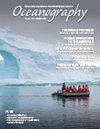Accelerating Research and Development in the US Arctic Reflections on a NOAA Program
IF 2.8
4区 地球科学
Q1 OCEANOGRAPHY
引用次数: 1
Abstract
Since 2015, the Innovative Technology for Arctic Exploration (ITAE) program has supported maritime technology development that contributes to economic growth, ocean health, and ocean management in Alaska. The program does this in multiple ways: through public-private partnerships, platform and small-scale sensor design, and research to operations, commercialization, and application of science-driven technologies. ITAE is a high-risk, high-reward research collaborative that provides support and expertise for creative scientists pursuing highly innovative research solutions with the potential for broad impact in US Arctic marine sciences. This program is funded through NOAA to support projects that may be overlooked in the traditional peer-review process because of their inherent risk. However, not all risks lead to success, not every risk leads to failure, and not all failures eliminate success. Development and growth are nurtured by risk and temporary setbacks. The science advanced by these researchers and collaborators forges new paths of discovery. While the Arctic is an excellent testbed, in part, due to its extreme conditions, the technologies and lessons detailed here are transferable to oceanographic research outside of the Arctic. This paper reviews the program as well as the successes and failures of this dedicated Arctic innovation collaborative at the NOAA Pacific Marine Environmental Laboratory.加速美国北极地区的研究和发展对美国国家海洋和大气管理局项目的影响
自2015年以来,北极勘探创新技术(ITAE)项目一直支持有助于阿拉斯加经济增长、海洋健康和海洋管理的海事技术开发。该项目通过多种方式实现这一目标:通过公私合作伙伴关系、平台和小型传感器设计,以及从研究到运营、商业化和科学驱动技术的应用。ITAE是一个高风险、高回报的研究合作项目,为有创造力的科学家提供支持和专业知识,他们追求高度创新的研究解决方案,这些解决方案可能对美国北极海洋科学产生广泛影响。该项目由美国国家海洋和大气管理局资助,以支持在传统同行评审过程中可能因其固有风险而被忽视的项目。然而,不是所有的风险都会导致成功,不是所有的风险都会导致失败,也不是所有的失败都会消除成功。风险和暂时的挫折孕育着发展和增长。这些研究人员和合作者推进的科学开辟了新的发现之路。虽然北极是一个极好的试验台,但部分原因是它的极端条件,这里详细介绍的技术和经验可以转移到北极以外的海洋学研究。本文回顾了美国国家海洋和大气管理局太平洋海洋环境实验室北极创新合作项目的成功与失败。
本文章由计算机程序翻译,如有差异,请以英文原文为准。
求助全文
约1分钟内获得全文
求助全文
来源期刊

Oceanography
地学-海洋学
CiteScore
6.10
自引率
3.60%
发文量
39
审稿时长
6-12 weeks
期刊介绍:
First published in July 1988, Oceanography is the official magazine of The Oceanography Society. It contains peer-reviewed articles that chronicle all aspects of ocean science and its applications. In addition, Oceanography solicits and publishes news and information, meeting reports, hands-on laboratory exercises, career profiles, book reviews, and shorter, editor-reviewed articles that address public policy and education and how they are affected by science and technology. We encourage submission of short papers to the Breaking Waves section that describe novel approaches to multidisciplinary problems in ocean science.
 求助内容:
求助内容: 应助结果提醒方式:
应助结果提醒方式:


